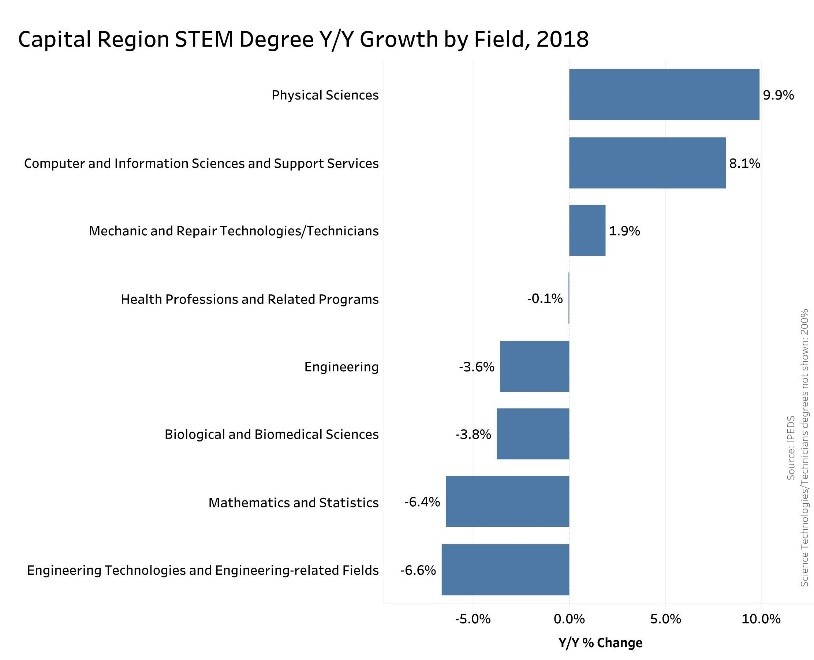STEM Degree Awards Edge up in the Capital Region
Capital Region colleges and universities made impressive gains in computer and physical sciences degree awards in 2018, while overall STEM degree growth slightly increased in the eight counties, according to a Center for Economic Growth (CEG) analysis on new data from the Integrated Postsecondary Education Data System.
STEM Growth
Last year, 17 of the Capital Region’s traditional higher education institutions together awarded 3,815 STEM degrees1, up 0.2 percent from the year earlier. That means one in four (26.4 percent) of all the degrees awarded in the region were in STEM fields. During the same period, 19 institutions in the eight-county region together saw a 0.1 percent decline in degrees awarded in the STEM-related field of health professions and other programs, totaling 1,917. At the region’s distance learning institutions2, awards for STEM degrees fell 1.3 percent to 8,400 and for health professions and related programs they declined 0.7 percent to 1,585.
Fastest-Growing Fields
With a 9.9 percent annual increase in degrees awarded, the physical sciences were the region’s fastest-growing STEM field, followed by computer and information sciences at 8.1 percent. Engineering, the region’s largest STEM field with 1,225 STEM degrees awarded, experienced a 3.6 percent annual decline. However, the expansion of the University at Albany’s engineering school should help reverse that trend.
UAlbany is transforming downtown Albany’s historic Schuyler Building into the new home of the College of Engineering and Applied Science. The Schuyler Building’s south half is expected to open in 2022-2023. The new, purpose-built engineering labs and classrooms in the CEAS will increase UAlbany’s capacity for engineering students and new engineering programs. The university’s first engineering program, computer engineering, launched in 2016, and earlier this year it added an Environmental and Sustainable Engineering program.
CEG Activities
New initiatives driven by CEG and its partners to grow the region’s STEM workforce include the following projects and programs. See the Workforce Development and Talent sections of the Capital Region Economic Development Council’s 2019 Progress Report for details on these projects and programs.
Gene F. Haas Center for Advanced Manufacturing (Hudson Valley Community College)
Manufacturing Technologies Pathways Boot Camp (CEG/HVCC)
Certified Production Technician Program (CEG/ SUNY Schenectady)
Capital Region Manufacturing Intermediary Apprenticeship Program (CEG/HVCC)
Capital Region Software Developer Apprenticeship Program (CEG/SUNY Schenectady/Albany Can Code)
Engineering Technician Program (Capital Region BOCES)
Entertainment Technologies Program (Capital Region BOCES/Fulton-Montgomery Community College)
Electronics Technician Apprenticeship Program (HVCC/GLOBALFOUNDRIES)
Game Design Program (SUNY Schenectady)
Mechatronics Certificate Program (SUNY Schenectady)
Nursing Program Expansion (Maria College)
Expanded Health Careers (Capital Region BOCES)
Adult Welding (Capital Region BOCES)
Telecommunications and Network Cabling Technician (Capital Region BOCES)
Notes
1 STEM fields include: Computer and Information Sciences, Engineering, Engineering Technologies and Engineering-related Fields, Biological and Biomedical Sciences, Physical Sciences, Science Technologies/Technicians, Mechanics and Repair Technologies/Technicians and Mathematics and Statistics.
2 SUNY Empire State College and Excelsior College.













